The Role of Diet and Nutrition in Autism Management
Unlocking the Potential of Nutrition in Autism Care

Understanding the intersection of diet, gut health, and autism
Diet and nutrition play a pivotal role in the holistic management of autism spectrum disorder (ASD). While traditional therapies focus on behavioral and educational interventions, emerging research highlights the importance of tailored dietary strategies to improve digestive health, behavioral outcomes, and overall well-being. Given the complexity and individual variability in ASD, an integrated approach involving healthcare professionals, particularly dietitians, is essential for optimizing health and quality of life.
General Dietary Considerations for Autism Care
What are some general dietary considerations for autism care?
Children and adults with autism often have unique sensory sensitivities that influence their eating habits. They may react strongly to certain smells, sights, tastes, textures, or temperatures, which can lead to limited food choices or food aversion. Recognizing and accommodating these sensitivities is crucial for ensuring adequate nutrition.
Creating a consistent mealtime routine and a sensory-friendly environment can help reduce mealtime stress. For example, offering foods at the same time each day, minimizing noise and distractions, and presenting foods in familiar formats can encourage acceptance and improve eating behaviors.
Gastrointestinal (GI) issues such as constipation, diarrhea, and reflux are common among autistic individuals. Dietary modifications, such as increasing fiber intake, maintaining hydration, and avoiding problematic foods, can help manage these symptoms. Sometimes, supplements like probiotics, prebiotics, or digestive enzymes are recommended after consulting healthcare professionals.
Addressing nutritional deficiencies is vital because many children with autism tend to be selective eaters, often avoiding certain food groups like dairy, fruits, or vegetables. This can result in low intake of essential nutrients, such as calcium, protein, vitamins D and B, and minerals like zinc. Regular nutritional assessments conducted by dietitians ensure that individual dietary needs are met.
While exploring specialized diets like gluten-free or casein-free, it is important to do so under medical supervision. These diets may carry risks of nutrient deficiencies if not carefully managed. Balancing dietary restrictions with nutritional adequacy requires professional guidance to avoid potential health issues.
In summary, understanding each person’s sensory sensitivities, establishing stable routines, managing gastrointestinal health, and obtaining professional nutritional support are fundamental components of comprehensive dietary management in autism care.
The Significance of Diet and Nutrition in Autism Spectrum Disorder Management
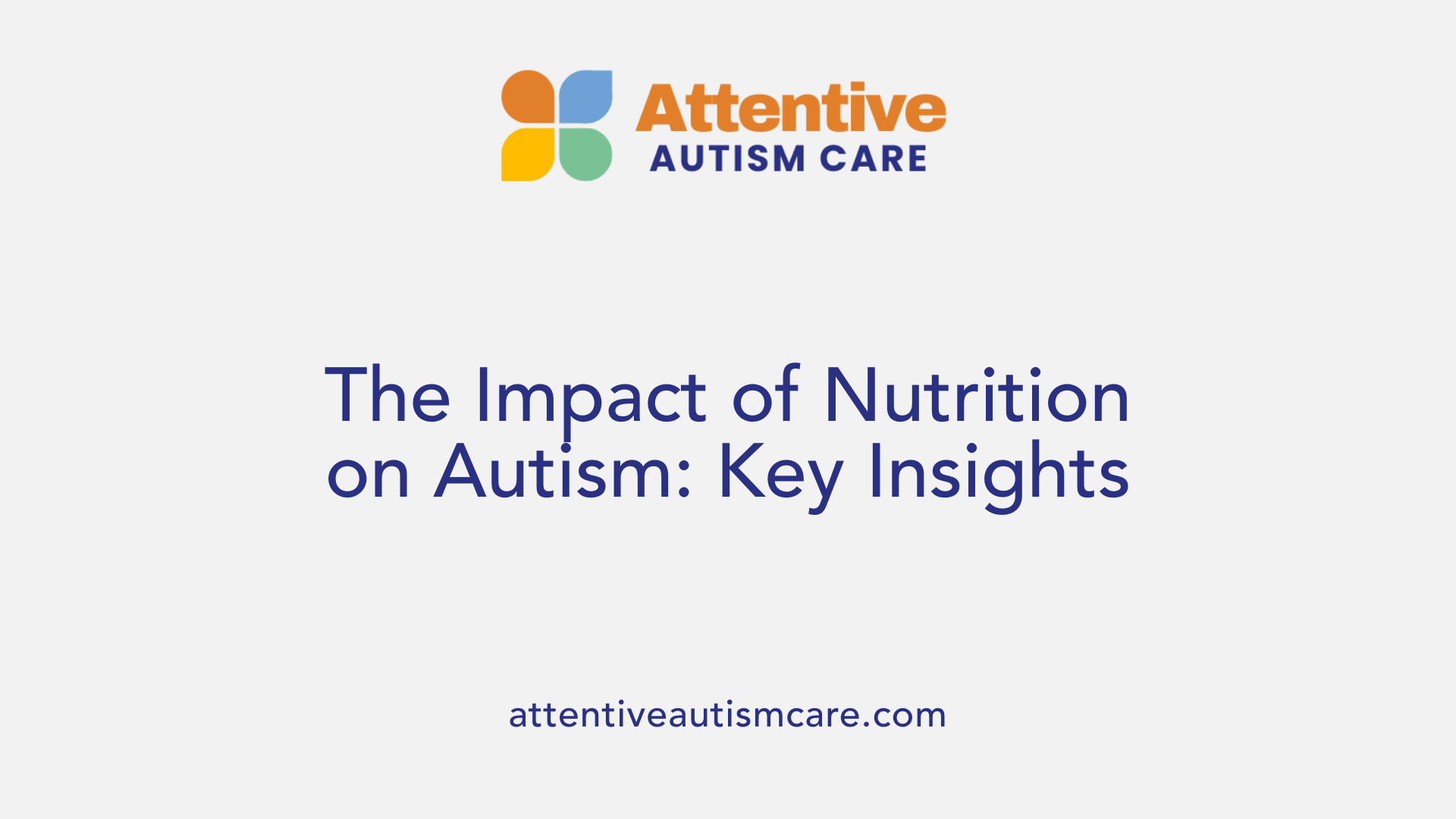
What is the role of diet and nutrition in autism spectrum disorder (ASD) management?
Diet and nutrition are important components in managing ASD because they can influence several aspects of a child's health, including digestion, mood, behavior, and cognitive abilities. Children with ASD often experience selective eating habits or limited diets due to sensory sensitivities, which can lead to deficiencies in vital nutrients such as calcium, vitamin D, B12, vitamin C, zinc, and protein. These nutrients are crucial for overall growth, brain development, and immune function.
Some dietary interventions aim to improve symptoms or health by addressing gut health and nutrient intake. For example, vitamin D3 supplementation has been linked to better social responsiveness, while compounds like sulforaphane, derived from broccoli, have shown potential in modulating behavioral symptoms.
Specialized diets, like gluten-free and casein-free (GFCF), as well as the Feingold diet, are popular among families seeking symptom relief. These diets are believed to reduce food-related sensitivities and to lessen behaviors such as hyperactivity or irritability.
Supporting gut health through probiotics and prebiotics also plays a role in managing ASD symptoms, as many children experience gastrointestinal issues like constipation, diarrhea, and reflux. Improving blood sugar stability by reducing processed foods and increasing intake of fiber-rich, whole foods can help manage mood swings and maintain focus.
Omega-3 fatty acids, found in fatty fish and certain plant oils, are known to support brain health and might reduce hyperactivity and improve communication.
Despite the promising nature of these approaches, scientific evidence remains limited. Most studies are preliminary, with small sample sizes and varied methodologies. Hence, while diet and nutrition can be beneficial, they should be tailored to each individual's needs and managed under professional supervision.
In the context of ASD management, a multidisciplinary approach combining dietary strategies with behavioral therapies, educational support, and medical care is recommended to optimize outcomes.
Overview of Dietary Therapies in Autism Management
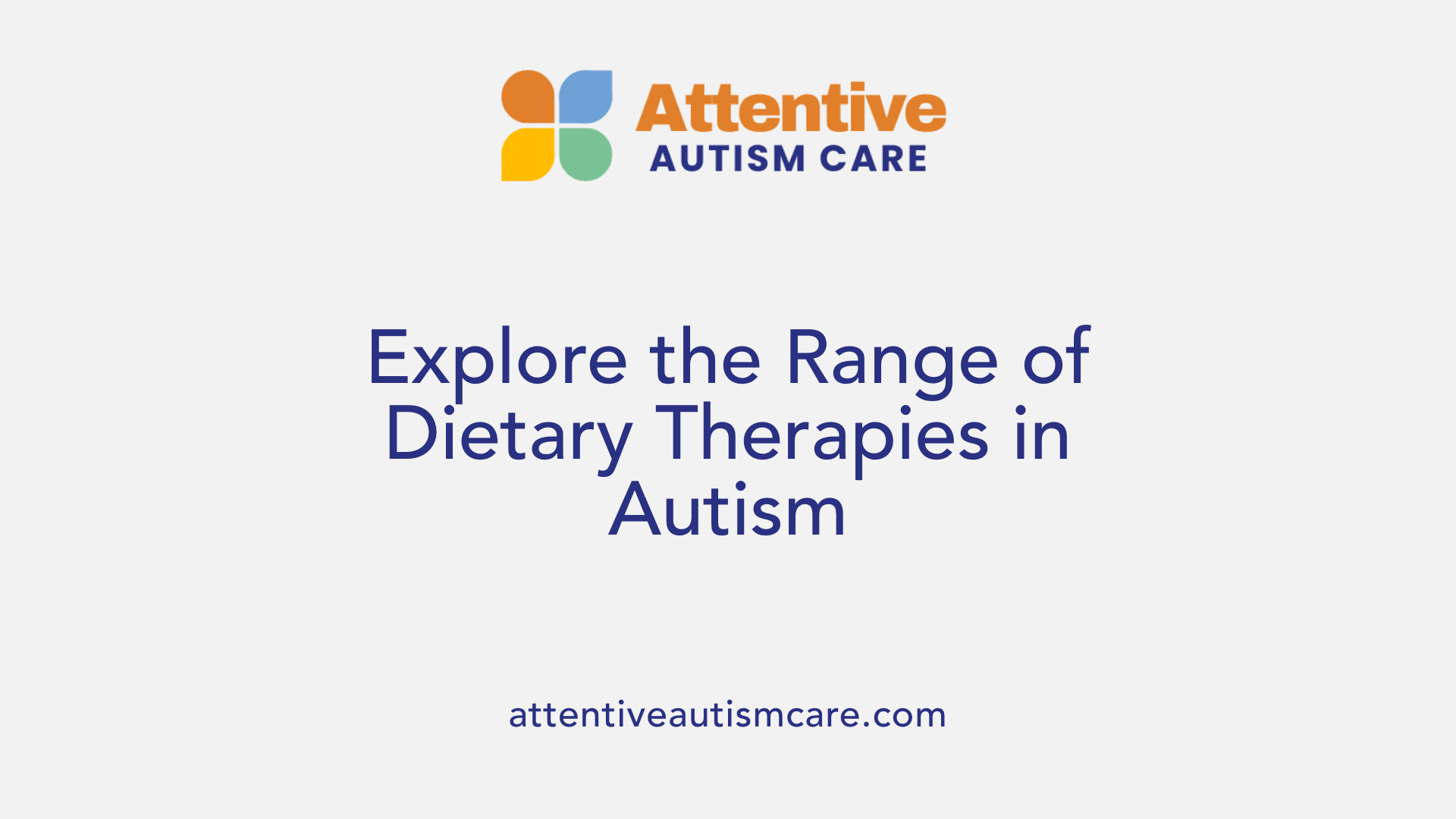
What dietary therapies and nutritional interventions are used in autism management?
Managing autism symptoms often involves various dietary strategies and nutritional interventions tailored to individual needs. One common approach is the gluten-free and casein-free (GFCF) diet. This diet eliminates wheat and dairy proteins under the premise that these may produce opioid-like peptides that influence behavior and gut health. Some parents and caregivers report behavioral and gastrointestinal improvements when following this diet, but scientific studies offer mixed evidence about its overall effectiveness.
Another dietary model explored is the ketogenic diet, which is high in fats and low in carbohydrates. Small studies and case reports suggest it may improve social behaviors, communication, and reduce repetitive behaviors, especially in animal models. However, maintaining this diet can be challenging, and more rigorous research is needed to establish its safety and long-term benefits.
Probiotics and prebiotics play a significant role in modulating the gut microbiome, which can impact gastrointestinal health and behavior. Children with ASD often experience GI disturbances like constipation and diarrhea, linked to altered gut bacteria. Restoring microbiome balance through probiotic supplementation may alleviate some gastrointestinal and behavioral symptoms, but further evidence is necessary.
Vitamins and mineral supplements—such as omega-3 fatty acids, B vitamins, magnesium, zinc, and folate—have been widely studied for their potential to support brain development and reduce symptoms. For example, omega-3s are associated with improvements in social responsiveness and hyperactivity. Vitamin D deficiency is a concern, with some studies indicating that supplementation can improve social and verbal skills.
Importantly, these interventions must be personalized. Collaborating with healthcare professionals, especially registered dietitians, ensures nutritional adequacy and helps monitor for deficiencies or adverse effects. While dietary therapies offer promising avenues for symptom management, they are most effective when integrated into a comprehensive, multidisciplinary treatment plan tailored to the individual's unique profile.
Gut-Brain Axis and Dietary Strategies Supporting Gut Health
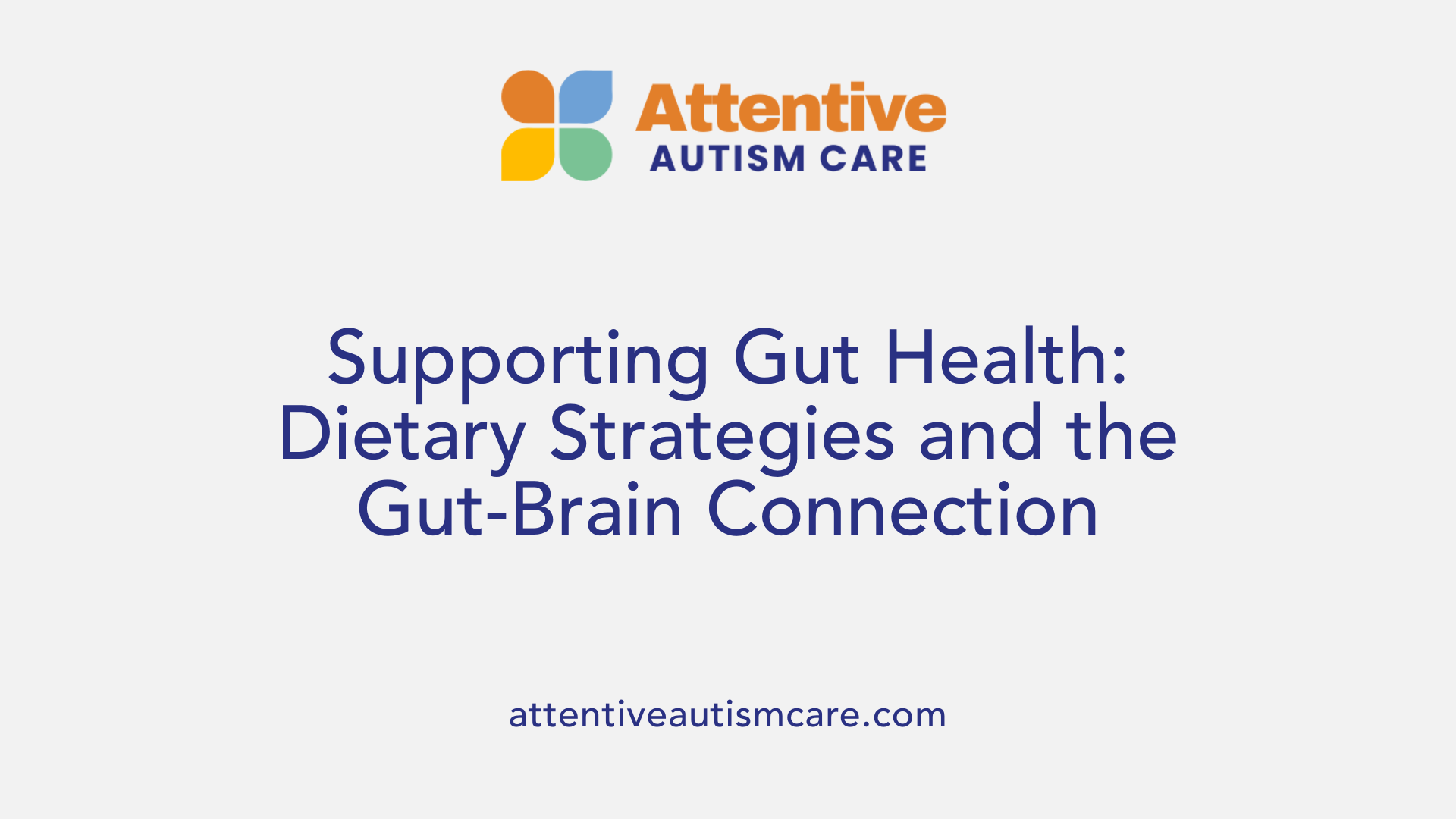
How does gut health relate to autism symptoms, and what dietary strategies can support gut health?
Many children and adults with autism experience gastrointestinal (GI) problems such as constipation, diarrhea, and abdominal discomfort. Research has increasingly highlighted the important role of the gut-brain axis—the bidirectional communication pathway between the gastrointestinal system and the brain—in influencing autism symptoms.
Disruptions in the gut microbiota, the community of bacteria living in the intestines, can affect immune function and production of neuroactive metabolites like short-chain fatty acids and tryptophan derivatives. These substances influence brain chemistry and behavior, suggesting that an imbalanced microbiome might exacerbate behavioral issues in autism.
Factors such as antibiotic use, birth method, diet, and exposure to environmental toxins can alter the microbiota composition. For example, a less diverse microbiome with an overgrowth of pathogenic bacteria has been linked to increased severity of autism symptoms.
Dietary interventions aimed at improving gut health have gained attention. Increasing fiber intake supports the growth of beneficial bacteria, producing healthy metabolites that can enhance intestinal barrier function and reduce inflammation.
Probiotic supplementation introduces beneficial bacteria like Lactobacillus and Bifidobacterium strains, which can restore microbial balance and improve digestive issues. Prebiotics, such as inulin and oligosaccharides, serve as food for these helpful bacteria, encouraging their growth.
Moreover, consuming a diet rich in whole foods, fruits, vegetables, and fermented products promotes diversity within the gut microbiome. Avoiding processed foods and excessive sugars can prevent dysbiosis—a microbial imbalance associated with worsened symptoms.
While current evidence is promising, more research is needed to solidify the role of microbiome-targeted therapies in autism management. Nevertheless, focusing on gut health through tailored diet and probiotic strategies presents a valuable component of a holistic treatment plan for improving behavior and gastrointestinal wellbeing.
The Crucial Role of Professional Guidance and Multidisciplinary Collaboration
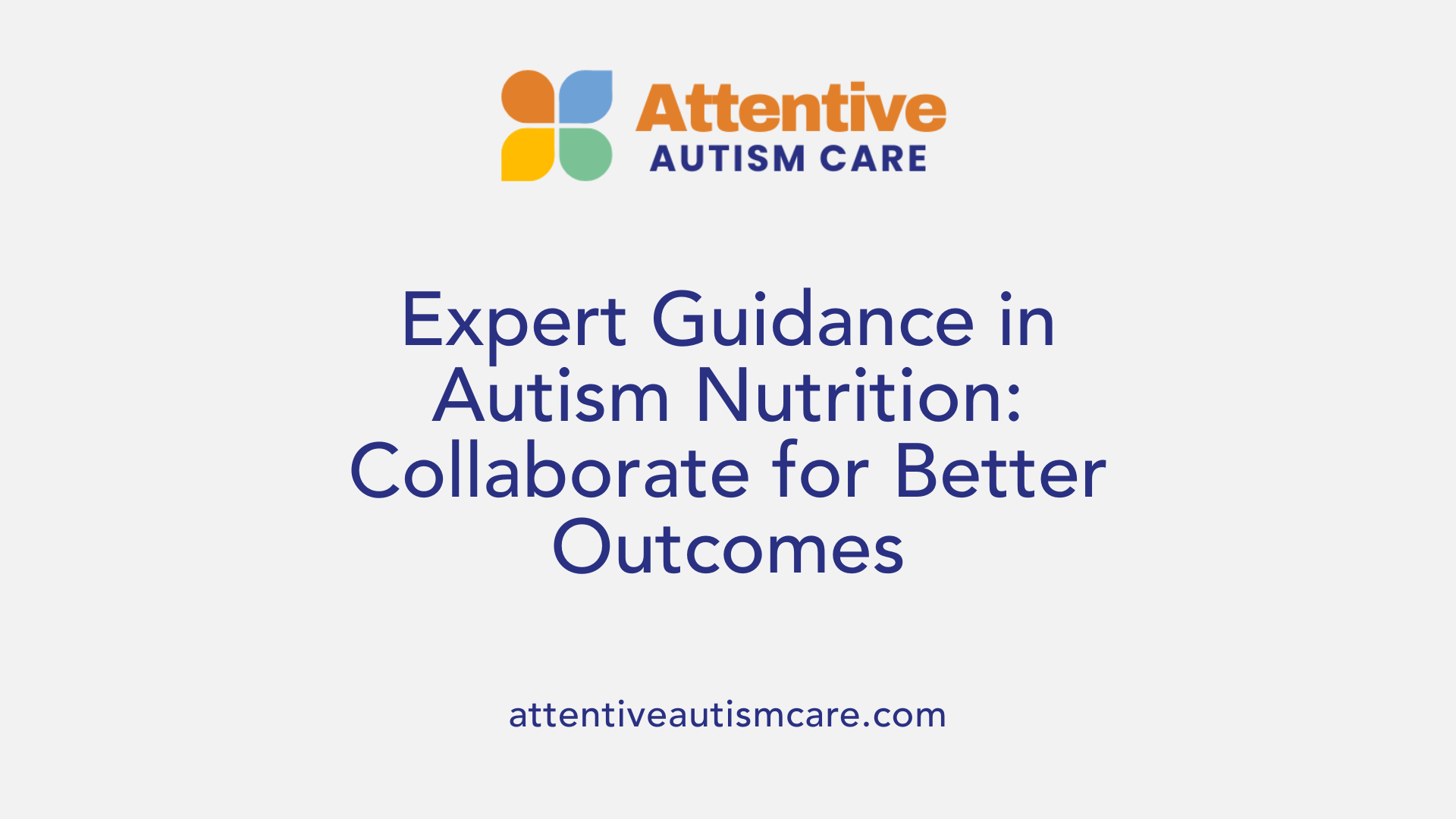
Why is professional guidance important when implementing dietary strategies for autism?
Implementing dietary strategies for children with autism requires careful planning and ongoing monitoring, making professional guidance indispensable. Registered Dietitians (RDs) are trained health care providers specializing in nutrition who can develop tailored meal plans that suit each child's unique needs, sensitivities, and medical conditions.
Autistic children often face challenges like food aversions, gastrointestinal issues such as constipation or diarrhea, and the risk of nutritional deficiencies due to selective eating habits. RDs assess these issues thoroughly, providing evidence-based advice to safely modify diets. They also help parents and caregivers navigate restrictive diets like gluten-free or casein-free regimens, ensuring nutritional adequacy.
Monitoring progress is another vital aspect where professionals play a key role. RDs track nutritional status, adjust dietary plans as needed, and manage supplementation with vitamins and minerals like vitamin D, B6, and zinc, which may support behavioral and developmental outcomes.
Moreover, collaboration among various healthcare providers—such as pediatricians, gastroenterologists, behavioral therapists, and educators—is essential for a comprehensive approach to managing autism. This team effort integrates dietary management with behavioral therapies, medical treatments, and educational support.
Family and caregiver involvement is equally important. Educating families about proper nutrition, meal routines, and the importance of diverse, balanced diets ensures consistency and adherence to dietary plans at home.
In summary, professional guidance from dietitians and a multidisciplinary team helps maximize benefits, prevent nutritional deficiencies, and promote overall health and optimal development in children with autism. This integrated approach ensures that dietary modifications support behavioral improvements while maintaining nutritional safety.
Limitations of Current Research and Need for Further Studies
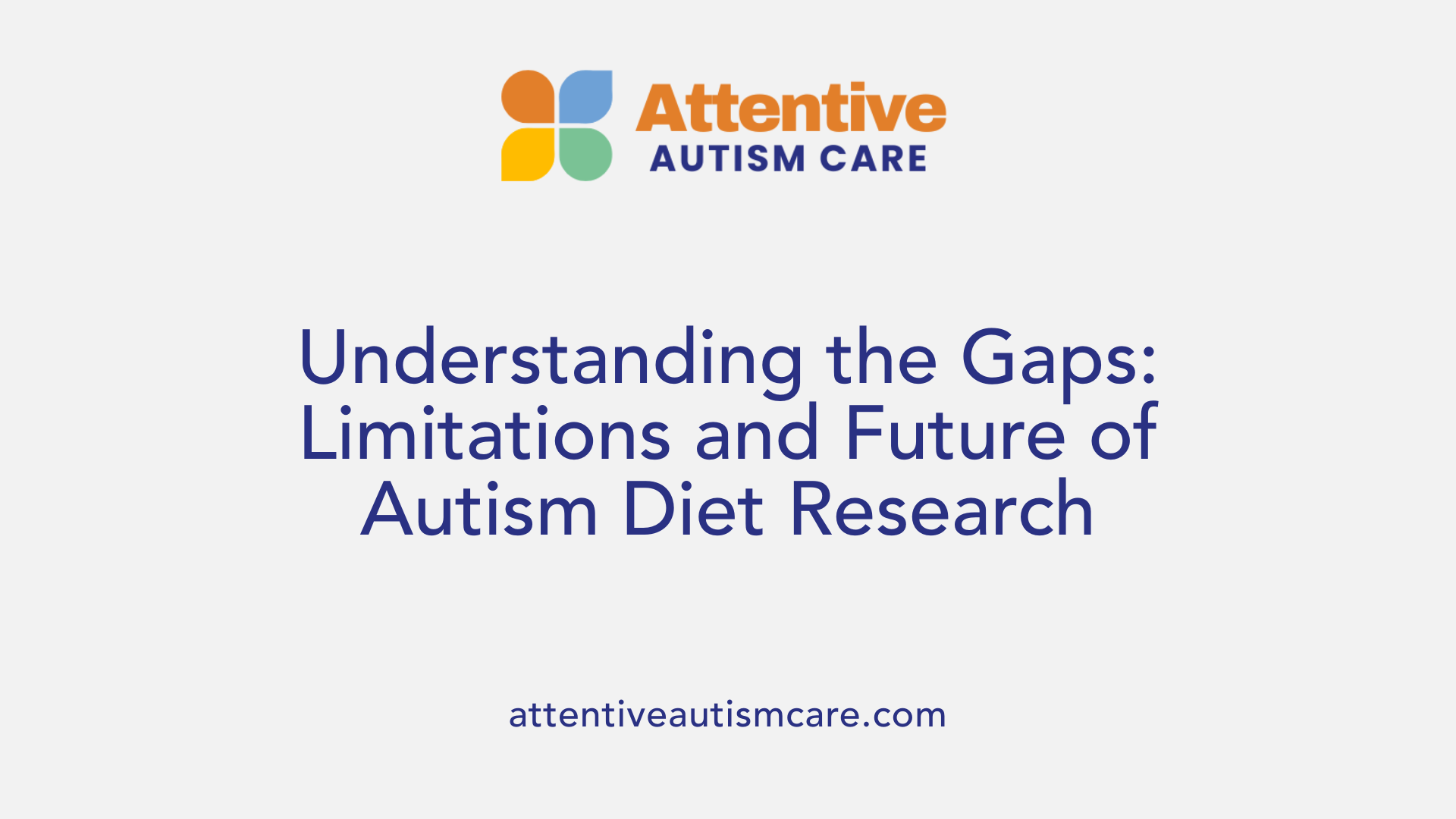 Many studies on dietary approaches for autism spectrum disorder (ASD) show promising results, but the current scientific landscape is marked by significant challenges. Methodological issues, such as small sample sizes, lack of control groups, and variability in intervention protocols, limit the strength of current evidence.
Many studies on dietary approaches for autism spectrum disorder (ASD) show promising results, but the current scientific landscape is marked by significant challenges. Methodological issues, such as small sample sizes, lack of control groups, and variability in intervention protocols, limit the strength of current evidence.
In addition, individual responses to dietary interventions can vary widely. Some children experience notable improvements in behavior and gastrointestinal symptoms, while others see little to no change. This variability makes it difficult to formulate universal recommendations.
Another major gap is the scarcity of high-quality clinical trials. Many studies are anecdotal or observational, which hampers the ability to draw definitive conclusions about the efficacy of diets like gluten-free, casein-free, ketogenic, or specific carbohydrate diets.
Furthermore, research on long-term safety and nutritional adequacy of restrictive diets is limited. Without comprehensive, large-scale studies, it remains unclear whether these diets can be safely maintained over extended periods without causing deficiencies.
Overall, while dietary interventions remain a popular and accessible option for many families, a substantial need exists for more rigorous, standardized research. Future studies should focus on large randomized controlled trials, exploring the mechanisms behind dietary impacts, and developing personalized nutrition strategies to better serve individuals with ASD.
Integrating Nutrition into Autism Care for Better Outcomes
While research continues to evolve, a consensus is emerging that tailored dietary interventions, when implemented under professional supervision, can complement traditional autism therapies and improve quality of life. Addressing gut health, ensuring nutritional adequacy, and individualizing diets are key components in this holistic approach. Collaboration among families, healthcare providers, dietitians, and educators is critical for safe and effective dietary management, offering hope for better behavioral, cognitive, and physical outcomes in people with autism.
References
- Nutritional management and autism spectrum disorder: A systematic ...
- A Review of the Nutritional Approach and the Role of Dietary ...
- The Role of Diet in Managing Autism Symptoms
- exploring their impact on autism spectrum disorders in childhood – A ...
- Nutrition and Autism Spectrum Disorder - Johns Hopkins Medicine
- Autism and Nutrition: The Connection Between Diet and Symptoms
- Autism and diet - BDA - British Dietetic Association




































































































